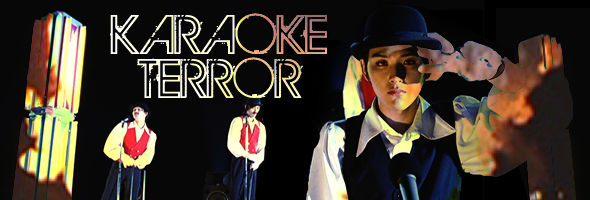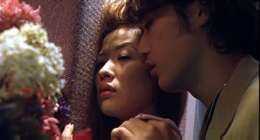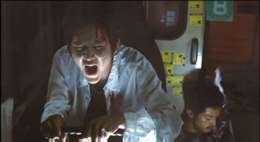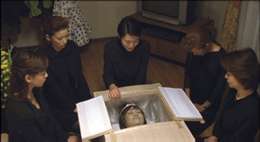

 A film that truly could have been made only in Japan, Karaoke Terror (adapted from a novel by Audition author Ryu Murakami) posits a world in which two rival gangs dedicated to escaping reality through stylized Karaoke routines engage in a battle fierce enough to touch off a culture firestorm -- literally. The bizarre face-off begins when Sugioka, a member of a young boy gang, murders an older woman who rejects his advances. It turns out she belongs to the Midoris, a rival group of affluent, bored housefraus who, like the bad lads, are dedicated to performing songs from the Showa pop music era (which lasted until the late 1980s). While not busy staging increasingly surreal musical spectacles, the gangs
A film that truly could have been made only in Japan, Karaoke Terror (adapted from a novel by Audition author Ryu Murakami) posits a world in which two rival gangs dedicated to escaping reality through stylized Karaoke routines engage in a battle fierce enough to touch off a culture firestorm -- literally. The bizarre face-off begins when Sugioka, a member of a young boy gang, murders an older woman who rejects his advances. It turns out she belongs to the Midoris, a rival group of affluent, bored housefraus who, like the bad lads, are dedicated to performing songs from the Showa pop music era (which lasted until the late 1980s). While not busy staging increasingly surreal musical spectacles, the gangs  begin to retaliate against each other in an increasingly brutal fashion, finding some inner vitality in the process.
begin to retaliate against each other in an increasingly brutal fashion, finding some inner vitality in the process.
Though it doesn't aim for the heights of violent satire classics like Battle Royale, this film (whose original title, Sh˘wa kay˘ daizenshű, is translated on the DVD packaging as The Complete Japanese Showa Songbook) manages to slip a surprisingly potent amount of social commentary into its succession of gaudy performance art sequences and blood-spewing acts of revenge. The finale may remind more than a few viewers of Fight Club, but the film also nods to a number of other influences, most obviously A Clockwork Orange as well as the works of Dennis Potter, whose juxtaposition of miming pop songs and shocking violence paid huge dividends in Pennies from Heaven and, of course, his Karaoke miniseries. All of the characters are essentially stylized markers for their gender and class stations, which is as it should be given the nature of the material. Newcomers to Japanese cinema might be completely baffled at times, but when  it works, Karaoke Terror certainly delivers a solid punch to the chops.
it works, Karaoke Terror certainly delivers a solid punch to the chops.
A film festival staple for years, this film finally makes its English-friendly debut courtesy of Synapse's well-appointed special edition DVD, which features an immaculate anamorphic transfer and thankfully informative, highly accessible subtitles. Audio this time out is 2.0 stereo, which serves it well enough (though why this film packed with sound effects and music didn't warrant a 5.1 mix is a bit of a mystery). In case anyone is left with lingering questions, the packed liner notes booklet provides a lot of context courtesy of Christine Yano's examination of the songs from the film and Nicholas Rucka's essay about the original source's author. As for video extras, you get the original Japanese trailer (which pretty much blows the finale), a TV spot, and best of all, a half-hour featurette covering the making of the film with the director, author, and most of the cast talking about the experience. Unfortunately a real gang war doesn't erupt between the cast members on the set, but that's about the only thing that's missing from this highly recommended release.